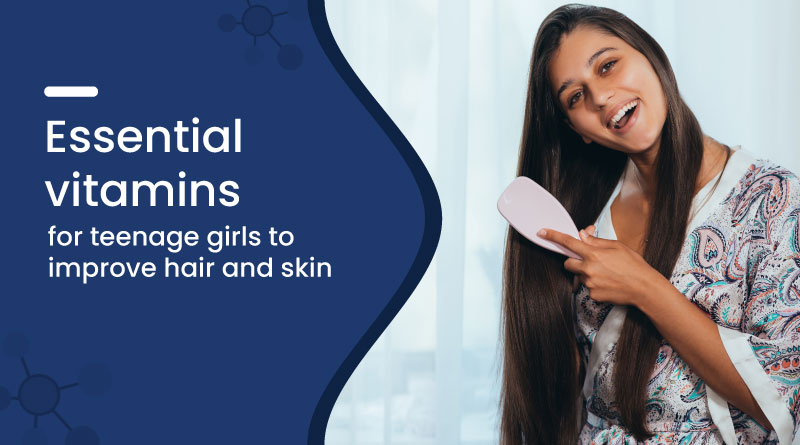What Vitamins Should a Teenage Girl Take Daily?


Teenage years are filled with hormonal changes that affect hair and skin health. That's why essential vitamins for teenage girls to improve hair and skin play a vital role. A well-balanced diet rich in the right nutrients can help reduce acne, dryness, hair fall, and dullness, promoting a radiant complexion and strong, healthy hair.
Why Are Essential Vitamins Important for Teenage Girls’ Hair and Skin?
During adolescence, the body undergoes major physical changes. These shifts often lead to oily skin, breakouts, dry patches, and excessive hair fall. Vitamins provide the building blocks for skin repair, hydration, and hair growth. They support collagen production, control sebum levels, and improve blood circulation to the scalp and skin.
Which Vitamin Helps with Hair Growth in Teenage Girls?
Biotin (Vitamin B7) is one of the most important vitamins for teenage girls to improve hair and skin. It strengthens hair, prevents breakage, and boosts growth. You can find it in foods like eggs, almonds, sweet potatoes, and seeds.
Other B-complex vitamins like B3 (Niacin) and B12 also help by improving blood flow to the scalp and nourishing hair follicles.
Which Vitamin Is Best for Clear and Glowing Skin?
Vitamin C boosts collagen and brightens skin. It reduces dark spots, fights free radicals, and keeps your skin firm. Teen girls dealing with acne or uneven tone will benefit from daily intake of vitamin C-rich foods like citrus fruits, berries, and bell peppers.
Vitamin E helps repair skin, retain moisture, and guard against sun damage.
How Does Vitamin A Benefit Teenage Girls’ Skin?
Vitamin A controls oil production, prevents pore blockages, and promotes skin renewal. It helps reduce acne and keeps skin clear. Good sources include carrots, spinach, and mangoes.
Retinoids, a derivative of Vitamin A, are commonly used in skincare for acne treatment and anti-aging, but teens should start with dietary sources unless advised by a dermatologist.
Can Vitamin D Improve Hair and Skin in Teenagers?
Yes. Vitamin D is not only important for bone health but also plays a role in hair follicle cycling and skin immunity. A deficiency in Vitamin D can lead to hair thinning and dull, dry skin.
Sun exposure is a natural way to get vitamin D, but foods like fortified dairy, fish, and eggs can also help meet daily needs.
Which Minerals Support Vitamin Function for Hair and Skin?
Vitamins work better when combined with the right minerals. Here are some key ones:
- Zinc: Helps fight acne-causing bacteria and supports skin healing.
- Iron: Delivers oxygen to follicles and prevents hair loss.
- Selenium: Protects skin from oxidative stress.
- Omega-3 Fatty Acids: Though not a vitamin, they are crucial for skin hydration and reducing inflammation.
What Are the Best Dietary Sources of Essential Vitamins for Hair and Skin?
Here are some everyday foods rich in essential vitamins for teenage girls:
| Vitamin / Mineral | Food Sources |
|---|---|
| Vitamin A | Carrots, sweet potatoes, spinach |
| Vitamin B complex | Eggs, nuts, whole grains |
| Vitamin C | Oranges, strawberries, kiwi |
| Vitamin D | Fortified milk, egg yolks, sunlight |
| Vitamin E | Sunflower seeds, almonds, avocados |
| Zinc | Chickpeas, lentils, pumpkin seeds |
| Iron | Spinach, red meat, tofu |
Balanced meals are more effective than supplements unless there's a diagnosed deficiency.
How Can Teenage Girls Ensure They Get Enough Vitamins Daily?
Here are a few practical tips:
- Eat a colorful plate: More variety = more nutrients
- Avoid junk food: It depletes your body of essential vitamins
- Stay hydrated: Water supports skin clarity and vitamin absorption
- Include protein: Hair is made of keratin, a type of protein
- Follow a consistent routine: Irregular eating can disrupt nutrient balance
Frequently Asked Questions
Q. Can vitamin deficiency cause hair fall in teenage girls?
A: Yes, lack of essential vitamins like biotin, vitamin D, and iron can lead to increased hair fall.
Q. Is it safe for teenagers to take multivitamin supplements for hair and skin?
A: Yes, but only if prescribed by a doctor. A balanced diet should be the first priority.
Q. Which vitamin deficiency causes dry and dull skin?
A: Deficiencies in Vitamin A, C, and E can lead to dry, lifeless skin.
Q. How can I improve my skin naturally as a teenager?
A: Eat vitamin-rich foods, drink plenty of water, avoid sugary snacks, and follow a gentle skincare routine.
Q. Does vitamin C remove acne scars?
A: Vitamin C helps fade acne scars by boosting collagen and reducing pigmentation over time.
Conclusion
Maintaining healthy hair and glowing skin during teenage years is not just about creams and shampoos. It begins with nourishing your body from within with essential vitamins. Eating the right foods, staying consistent with your meals, and understanding your body's needs will go a long
Recent Blogs
Disclaimer : Zeelab Pharmacy provides health information for knowledge only. Do not self-medicate. Always consult a qualified doctor before starting, stopping, or changing any medicine or treatment.
















 Added!
Added!